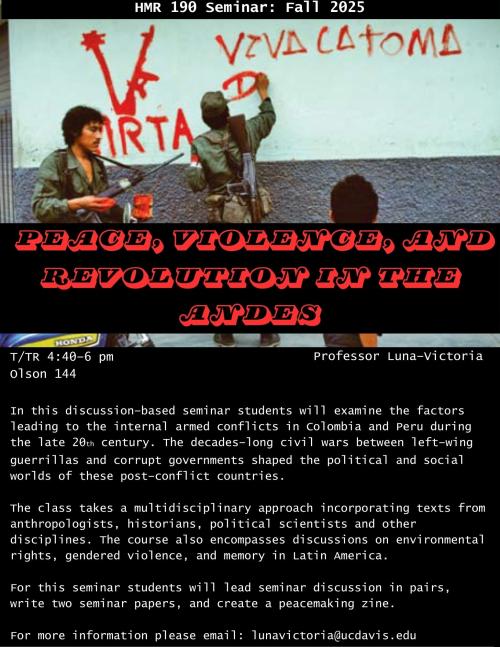Fall Quarter 2025
- For day, time, room, and TA information, see our:
PDF Schedule or Schedule Builder - For all courses not described here, see:
Catalog Descriptions
HMR 001 — Human Wrongs/Human Rights
Keith Watenpaugh
HMR 134 — Human Rights
Keith Watenpaugh
HMR 140A — Human Rights & the Popular Imagination
Lucia Luna Victoria Indacochea
HMR 190 — Human Rights Seminar - Peace, Violence, and Revolution in the Andes
Lucia Luna Victoria Indacochea

This upper-level seminar will examine the factors leading to the internal armed conflicts in Colombia and Peru during the late 20th century. The decades-long civil wars between left-wing guerrillas and corrupt governments shaped the political and social worlds of these post-conflict countries. The course will examine the cases studies in-depth, as well as investigate theories on violence, revolution, and transitional justice. Students will analyze civil society’s efforts to hold the guerrillas, paramilitary groups, and state accountable for human rights abuses, as well as the remaining fights to end drug trafficking, political corruption, and violence. The class takes a multidisciplinary approach incorporating texts from anthropologists, historians, political scientists and other disciplines.
This course will also interest students seeking to learn about environmental rights, gendered violence during and after periods of conflict, and memory in Latin America.
HMR 200A — Human Rights
History — Theory — Criticism of Human Rights
Keith Watenpaugh-kwatenpaugh@ucdavis.edu
Please contact Prof. Watenpaugh for permission to enroll in this course.
In this seminar, taught in conjunction with the advanced undergraduate course, HMR 134 Human Rights, students will study the theory of human rights in the modern period, the history of human rights ideas, movements, and institutions and explore core contemporary human rights issues, including at the intersection of human rights, climate change, indigeneity and forced migration. The seminar, one of two core required courses in the Human Rights DE, is particularly useful for students with little or no prior experience in the formal study of human rights and is designed to prepare them to integrate the human rights idea into their research, teaching and public scholarship.
Students will be expected to attend lecture M/W 2:10 – 4:00, followed by a two-hour meeting on Wednesdays 4:00 PM – 6:00 PM. They will author three critical essays and prepare and deliver a lecture.
Key texts:
Kathryn Sikkink, Evidence for Hope: Making Human Rights Work in the 21st Century (Princeton: Princeton University Press, 2017).
Noura Erakat, Justice for Some: Law and the Question of Palestine (Palo Alto: Stanford University Press, 2019.)
Achille Mbembe, Necropolitics (Durham: Duke University Press, 2019)
Jacqueline Bhabha, Child Migration and Human Rights in a Global Age (Princeton University Press, 2014.)
Journal of Genocide Research, special series on Gaza and Genocide Studies.
Professor, Human Rights Studies
University of California, Davis
